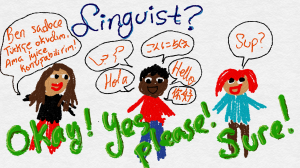How many languages do you need to speak to be a linguist?
-Gamerro
***
Dear Gamerro,
At minimum? One.
Linguistics is a wide-open field – there are a whole helluva lot of ways to study language, and not all of them require polyglottery. A linguist who works as an expert witness in legal proceedings, for example, might help decipher what people are saying in a distorted recording, or could work in authorship attribution. Someone studying language acquisition might research how young children absorb pluralization rules in their first language, no seconds required. Or they could study a single aspect of the first language in intense detail, like intonation. Or pronouns.
Many linguists do study a second (or third, or eighth) language, but even that may not require speaking per se. Linguists might study several ancient languages to reconstruct even more ancient ones, like Proto-Indo-European (but Proto-World, not so much). Some researchers try to piece together languages that have been lost to time, like Linear A or Olmec. Or they might cross over with theology, trying to reconstruct the earliest meanings of the earliest copies of religious texts like the Gospels.
And when we get into linguists that do study modern languages, we open up a whole new question: what does it mean to “speak” a language? Say a linguist studies the dative case, and knows an enormous amount about how that works everything from Swahili to Vietnamese, but couldn’t ask for directions if set down in Ho Chi Minh City. Is that speaking? Not really. This is why linguists get a reputation as language dabblers – we might know bits and pieces of a dozen tongues, but be nowhere near fluency in any of them.

I wanted that first gal to speak a dead language, but I don’t know any. If you know Latin or Sanskrit and wanna translate a line, hit me up.
People who don’t study languages tend to assume a nothing-or-all distinction; you don’t know French, or you do. Flip that switch, and bing! You speak Chinese! But once you’ve really tried to use a language or three, you tend to see finer gradations in ability. I know enough German to study at a university, enough Japanese to have a conversation, enough Turkish to barely scrape by, and tiny scraps of Arabic and Korean. So how many languages do I speak? I’d say just German. (Well, and English.) But there’s no sharp line between speaking and not-speaking. It’s fuzzy and never-ending; there’s no point where you say, “Yep, I’ve learned all of Xhosa, done now.” Heck, authors and other literary types can spend their whole lives studying their first languages to greater and greater precision. Learning a second language is the very definition of journey, not destination.
There are many linguists who are truly multilingual and can move effortlessly from one language to another, and even a few hyperpolyglots out there who can switch between a dozen or more languages with ease. And their work is fascinating, but it’s not the only kind of work. There are so many fields, subfields, and tiny nooks and crannies in linguistics – no matter how many languages you know, don’t know, or want to know, there’s a corner for you. Welcome, and settle in.
Yours,
The Language Nerd
Got a language question? Ask the Language Nerd! asktheleagueofnerds@gmail.com
Twitter @AskTheLeague / facebook.com/asktheleagueofnerds
I’ve been writing about linguistics for almost two years now and have barely scratched the surface; there are huge areas that I’ve never even mentioned (like, uh, all of morphology). Just for a sample, here’s a few posts about English–only areas, and here are some that cross languages.